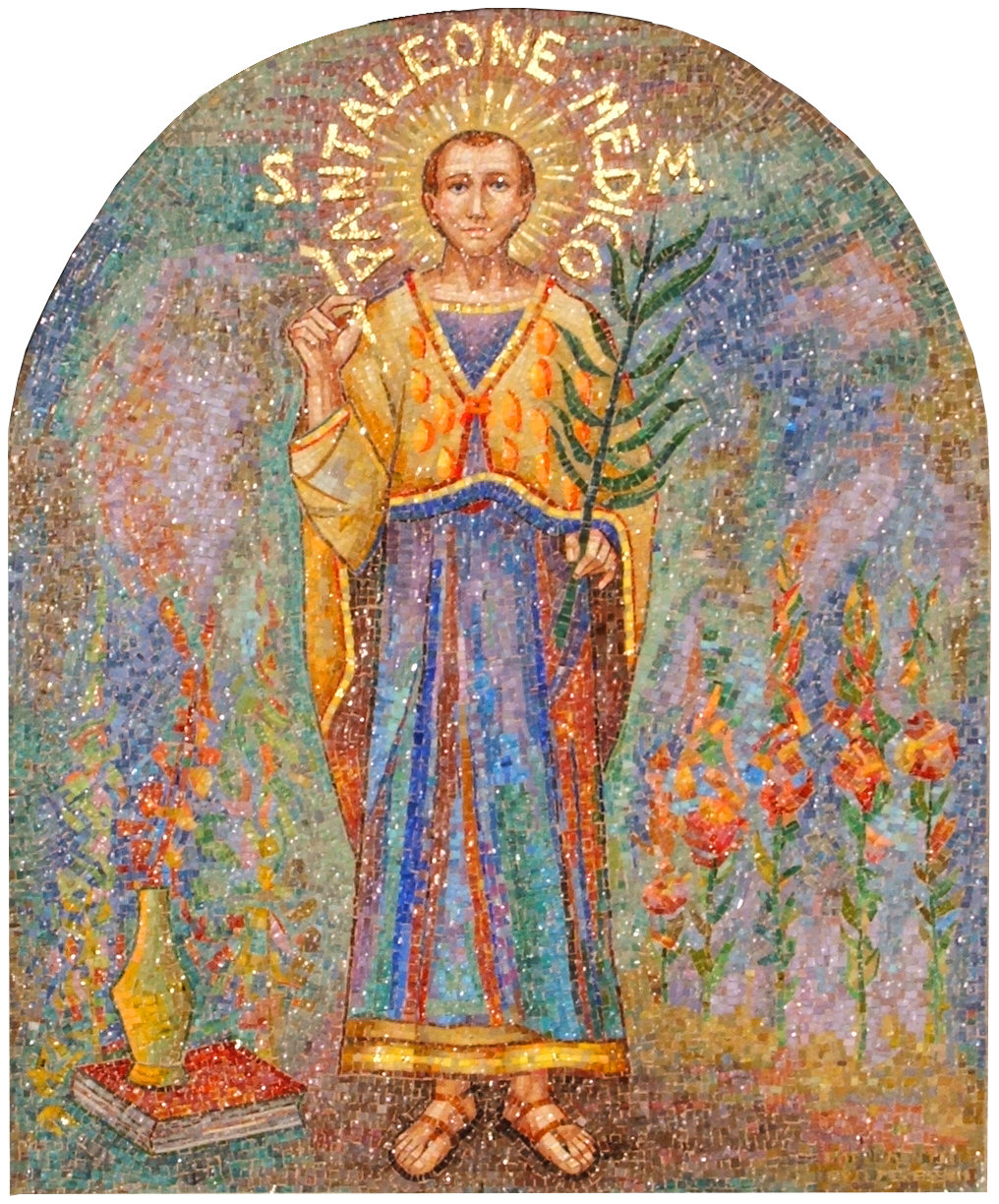
Friday, July 31, 2009
Gradual Psalms

Matters Jesuitical
Perth, W.A. Latin Mass - August Bulletin
AUGUST 2009 NOTICES
Month of the Assumption
ST JOHN’S PRO-CATHEDRAL, Victoria Ave, Perth
The Traditional Latin Mass times & schedule at the Pro-Cathedral: Masses on
Sundays- 7.30am & 9.15am & 11.15am with the rosary prayed before Masses.
Mass can be followed in Latin/English/Italian Missals available for use at the door.
Hymn books and purple Kyriales for sung Masses are available for use also.
SUNDAY August 2 7.30am & 9.15am & 11.15am 9th After Pentecost
Monday 3 7.45am Finding of the Body of St Stephen
Tuesday 4 7.45am St Dominic, Confessor
Wednesday 5 10.00am Preceded by Holy Hour & Benediction. 8.45am – 9.45am
Our Lady of the Snows
Thursday 6 12.10pm TRANSFIGURATION OF OUR LORD preceded by
Holy Hour and Benediction 11.00am – 12.00noon.
Friday 7 6.30pm St Cajetan, preceded by Holy Hour & First
Friday Benediction 5.30pm – 6.15pm
Saturday 8 9.00am St John Vianney & Blessed Mary McKillop & Benediction
SUNDAY August 9 7.30am & 9.15am & 11.15am 10th After Pentecost
Monday 10 7.45am St Lawrence, Martyr
Tuesday 11 6.30pm St Philomena, Preceded by
Devotions & Benediction 5.30pm – 6.15pm
Wednesday 12 10.00am Preceded by Holy Hour & Benediction. 8.45am – 9.45am
St Clare of Assisi, Virgin
Thursday 13 12.10pm St Hippolytus & Cassian preceded by FATIMA DEVOTIONS
and Benediction 11.00am – 12.00noon.
Friday 14 5.30pm VIGIL OF THE ASSUMPTION
Saturday 15 8.00am & 10.00am & 6.00pm ASSUMPTION OF THE BLESSED
VIRGIN MARY. HOLY DAY OF OBLIGATION
SUNDAY August 16 7.30am & 9.15am & 11.15am 11th After Pentecost
Monday 17 5.30pm St Hyacinth, Confessor
Tuesday 18 7.45am St Agapitus, Martyr
Wednesday 19 10.00am Preceded by Holy Hour & Benediction. 8.45am – 9.45am
St John Eudes, Confessor
Thursday 20 12.10pm St Bernard, Confessor
Friday 21 5.30pm St Jane de Chantal, Widow
Saturday 22 9.00am IMMACULATE HEART OF MARY then Benediction
SUNDAY August 23 7.30am & 9.15am & 11.15am 12th After Pentecost
Monday 24 7.45am St Bartholomew, Apostle
Tuesday 25 7.45am St Louis of France
Wednesday 26 10.00am Preceded by Holy Hour & Benediction. 8.45am – 9.45am
St Zephyrinus, Pope & Martyr
Thursday 27 12.10pm St Joseph Calasanctius
Friday 28 5.30pm St Augustine, Bishop
Saturday 29 9.00am Beheading of St John the Baptist
SUNDAY August 30 7.30am & 9.15am & 11.15am 13th After Pentecost
CONFESSIONS: Heard before Mass on Sunday, weekday Masses and after if necessary. Please make the effort to go to confession during the week so that those only able to make Sunday Mass can go then.
On Sundays please be there at least 10 minutes before Mass to go to confession otherwise may miss out.
SUNDAY MASS IN KELMSCOTT AT 2.00pm: Good Shepherd Church, 44 Streich Ave, Kelmscott
Also Mass on the feast of the Assumption Saturday 15th August at 12.00noon – Holy Day of Obligation.
MASS IN BUNBURY: St Thomas Church, Locke Street, Carey Park.
Sunday at 6.00pm: 16 August 09 Sunday 6 Sept 09 18 October 09
Monday: 17 August (8.00am) 7 Sept (8.00am) 19 October (8.00am)
Sunday 2nd August:Portiuncula Plenary Indulgence may be obtained, under the usual conditions,
to the faithful who devoutly visit a church and pray the Our Father and the Creed.
Fatima Devotions Thursday 13th August beginning 11.00am with Exposition and Benediction, rosary, litany & Fatima prayers, Mass at 12.10pm; continuing on the 13th of each month until October.
Feast of the Assumption Saturday 15th August 2009: Masses at 8.00am, 10.00am & 6.00pm at St John's Pro-Cathedral. Mass at 12.00noon at Good Shepherd Church, 44 Streich Ave, Kelmscott
PLEASE NOTE THAT THE ASSUMPTION IS A HOLY DAY OF OBLIGATION. THIS MEANS THAT WE ARE BOUND TO HEAR HOLY MASS.
Six Precepts of the Church: 1. Attend Mass on Sundays and Holy Days of Obligation. 2. Confess sins at least once a year. 3. Receive Holy Communion at least once during Easter season. 4. Observe the days of fast and abstinence. 5. Help provide for the needs of the Church. 6. Marry in a Catholic church.
Silent retreat in Toodyay, Sunday evening 4th October – Friday afternoon 9th October 2009.
Contact Fr Rowe for further details and to register for the retreat.
Daily Latin/English Missal for sale:Never been used. $100 see Fr Rowe
Book Barrow: 9 August after all Sunday Masses. www.stritabooks.com (08) 9446-5069
Flowers for the Altar: If anyone has any spare flowers at home, please bring to the church so they can be arranged before Mass. Donations for flowers may also be placed in box on bookcase.
New Email addresses: If you wish to receive a copy of the bulletin and notices by email, please email the following address: latinmassbulletinwa@iinet.net.au Each month the notices will be emailed to you automatically. If you wish to contact Fr about any other matter use the following email address: latinmasschaplaincywa@iinet.net.au Please use this email for all matters.
Seating at Sunday Masses: If possible, please always occupy the front pews close to the windows first, then the back pews. Be aware if you arrive late there are usually seats up the front so feel free to move up there. Each pew can comfortably fit four people so please move up to be courteous to others so they can find a space to sit.
Parking on Sundays in Mercedes College: Gates are locked after 11.15am Sunday Mass so make sure your car is out promptly. Please remember Mercedes College in your prayers and park courteously.
PLEASE MAKE SURE YOU PARK IN THE MARKED BAYS AND NOT ILLEGALLY.
Please note that smoking is not permitted in Mercedes, and ensure that your children are under adult supervision on school grounds at all times.
Latin Mass Website: http://latinmasswa.r8.org
Mantillas for sale: $12.00 available at the church from piety stall.
Holy water: Available from the sacristy, please bring a bottle and help yourself.
Toilets at hospital: facilities are open at Royal Perth Hospital in the main entrance and also next to the emergency entrance.
ANY QUERIES PLEASE CONTACT FR MICHAEL ROWE: Ph/Fax: (08) 9444-9604
PO Box 337 NORTH PERTH W.A. 6906
Email: latinmasschaplaincywa@iinet.net.au
PLEASE TAKE THIS WITH YOU FOR FUTURE REFERENCE
Thursday, July 30, 2009
Officia Propria
Excita, Domine, spiritum, quo Virginis filius Joannes illam dilexit, ut eo repleti studeamus amare, quam amavit, eidemque condolere, ut condoluit. Per.(Stir up, Lord, the spirit, with which the Virgin's son John loved her, that filled with it we may study to love what he loved, and to feel the same griefs that he grieved. Through…)
Chant Practice Resumed
SS Abdon and Sennen - II

The martyrs preferred torments and death to sin, because the love of God above all things reigned in their breasts. "We say we are Christians," says Tertullian; "we proclaim it to the whole world, even under the hands of the executioner, and in the midst of all the torments you inflict upon us to compel us to unsay it. Torn and mangled, and weltering in our blood, we cry out as loud as we are able to cry, That we are worshippers of God through Christ." Upon which Mr. Beeves observes, that no other religion ever produced any considerable number of martyrs except the true one. Do we ever read of any generation of men so greedy of martyrdom, who thought it long till they were upon the rack, and were so patient, so cheerful and stedfast under the most intolerable torments ? Socrates was the only philosopher that can be said to have died for his doctrine; and what a restless posture of mind does he betray, who was esteemed the best and the wisest of the heathens? With what misgivings, and fits, of hope sand fear, does he deliver himself in that most famous discourse, supposed to have been made by him a little before his death, about a future state? And neither Phaedo, Cebes, Crito, Simmias, nor any other of his greatest friends who were present at his death, durst maintain either his innocence, or that doctrine for which he died, in the Areopagus. With what reserve did Plato himself dogmatize concerning the gods whom he worshipped in public, but denied in private? How did he dodge about, disguise himself, and say and unsay the same excellent truths? Only the Christians suffered at this rate, and they held on suffering for several hundred years together, till they had subdued the world by dying for their religion. What could engage such a number of men in such a religion, and support them in it, in defiance of death in the most shocking forms, but evident truth, and a superior grace and strength from above?
Wednesday, July 29, 2009
43,73€
Monday, July 27, 2009
Saints o' the Day
Grant, prithee, God almighty: that, blessed Pantaleon Thy Martyr interceding, both from all adversities we may be delivered in body, and from depraved thoughts be cleansed in mind. Through our Lord Jesus Christ...

Sunday, July 26, 2009
Riverside Again
Saturday, July 25, 2009
St Anne
Ave gratia plena, Dominus tecum, tua gratia sit mecum; benedicta tu in mulieribus, et benedicta sit Sancta Anna mater tua, ex qua sine macula et peccato processisti, Virgo Maria; ex te autem natus est Jesus Christus Filius Dei vivi. Amen.(Hail, Mary, full of grace, the Lord is with thee; may thy grace be with me. Blessed art thou amongst women, and blessed is holy Anne thy mother, from whom, O Virgin Mary, thou didst come forth free from all stain of sin; then of thee was born Jesus Christ, Son of the living God. Amen.)
Commemoratio de omnibus Sanctis

Aña. Sancti Dei omnes, intercedere dignemini pro nostra omniumque salute.(All ye Saints of God, deign to intercede for our and all men's salvation.)V/. Lætamini in Domino, et exsultate, justi.R/. Et gloriamini omnes recti corde.(Rejoice in the Lord, and exult, ye just.(And glory, all ye upright of heart. - Ps. 31:11)Oremus.Protege, Domine, populum tuum, et Apostolorum tuorum Petri et Pauli, et aliorum Apostolorum patrocinio confidentem, perpetua defensione conserva.Omnes Sancti tui, quæsumus, Domine, nos ubique adjuvent, ut dum eorum merita recolimus, patrocinia sentiamus: et pacem tuam nostris concede temporibus, et ab Ecclesia tua cunctam repelle nequitiam: iter, actus, et voluntates nostras, et omnium famulorum tuorum, in salutis tuæ prosperitate dispone: benefactoribus nostris sempiterna bona retribue: et omnibus fidelibus defunctis requiem æternam concede. Per Dominum...(Protect, Lord, Thy people, and by Thy everlasting defence preserve them that trust in the patronage of Thy Apostles Peter and Paul, and the other Apostles.*(May all Thy Saints, we beg, Lord, everywhere help us, that when we recall their merits, we may feel their patronage: both grant us peace in our times, and drive away all wickedness from Thy Church: dispose our way, acts and wills, and that of all Thy servants, in the prosperity of Thy salvation: repay our benefactors with everlasting good things: and give eternal rest to all the faithful departed. Through...)
- for the patronage of SS Peter and Paul, and all Apostles;
- for the patronage of all Saints;
- for peace;
- against the enemies of Holy Church;
- for our salvation and that of all;
- for benefactors;
- for the dead.
Yes, Father, No, Father...
Byzantine Origins?
R/. Gaude, Maria Virgo, cunctas hæreses sola interemisti,quæ Gabrielis Archangeli dictis credidisti:* Dum Virgo Deum et hominem genuisti,et post partum, Virgo, inviolata permansisti.V/. Gabrielem Archangelum scimus divinitus te esse affatum:uterum tuum de Spiritu Sancto credimus imprægnatum:erubescat Judæus infelix, qui dicit Christum ex Joseph semine esse natum.* Dum Virgo Deum et hominem genuisti,et post partum, Virgo, inviolata permansisti.Gloria Patri, et Filio, et Spiritui Sancto.* Dum Virgo Deum et hominem genuisti,et post partum, Virgo, inviolata permansisti.(R/. Rejoice, Mary Virgin, all heresies alone thou hast crushed, who believed the things Gabriel Archangel said, * When, a Virgin, thou brought forth God and Man, and after birth, inviolate thou remained a Virgin. V/. We know Gabriel Archangel to have spoken by divine agency to thee: we believe thy womb was impregnated by the Holy Ghost: may that unhappy Jew blush, who said that Christ was born of the seed of Joseph. * When, a Virgin, thou brought forth God and Man, and after birth, inviolate thou remained a Virgin. Glory be to the Father, and to the Son, and to the Holy Ghost. * When, a Virgin, thou brought forth God and Man, and after birth, inviolate thou remained a Virgin. )
Friday, July 24, 2009
Placebo and Dirge

Baumstark's Laws of Liturgy
Wednesday, July 22, 2009
Laus Angelorum Magna
Gloria in excelsis Deo, et in terra pax hominibus bonae voluntatis. Laudamus te, hymnum dicimus tibi. Benedicimus te. Glorificamus te: adoramus te. Gratias tibi agimus propter magnam gloriam tuam, Domine Deus, rex caelestis, Deus Pater omnipotens, Jesu Christe, sancte Spiritus. Domine Deus, Filius Patris: Agnus Dei, qui tollis peccata mundi, suscipe deprecationem nostram. Qui sedes ad dexteram Patris, miserere nobis: miserere nobis, subveni nobis, dirige nos, conserva nos, munda nos, pacifica nos. Libera nos ab inimicis, a tentationibus, ab haereticis, ab arrianis, a schismaticis, a barbaris: quia tu solus sanctus, tu solus Dominus, tu solus Altissimus, Jesu Christe, in gloria Dei Patris cum sancto Spiritu in saecula saeculorum. Amen.(Glory in the highest to God, and on earth peace to men of good will. We praise Thee, a hymn we say to Thee. We bless Thee. We glorify Thee: we adore Thee. Thanks to Thee we give for Thy great glory, Lord God, heavenly King, God the Father almighty, Jesu Christ, [and] Holy Ghost. Lord God, Son of the Father: Lamb of God, Who takest away the sins of the world, receive our prayer. Who sittest at the right of the Father, have mercy on us: have mercy on us, come to help us, direct us, preserve us, cleanse us, pacify us. Deliver us from enemies, from temptations, from heretics, from Arians, from schismatics, from barbarians: for Thou only art holy, Thou only art the Lord, Thou only art the Most High, Jesu Christ, in the glory of God the Father with the Holy Spirit unto the ages of the ages. Amen.)
Gloria in excelsis Deo, * et in terra pax hominibus bonae voluntatis.
Laudamus te, hymnum dicimus tibi, * benedicimus te, adoramus te, glorificamus te.
Gratias tibi agimus propter magnam gloriam tuam, * Domine Deus, rex caelestis.
Deus Pater omnipotens, * Iesu Christe et sancte Spiritus.
Domine Deus, * Filius Patris
Agnus Dei, qui tollis peccata mundi, * suscipe deprecationem nostram;
Qui sedes ad dexteram Patris, * miserere nobis.
Miserere nobis, subveni nobis, dirige nos: * conserva nos, munda nos, pacifica nos.
Libera nos ab inimicis, * a tentationibus.
Quia tu solus sanctus, * tu solus Dominus, tu solus Altissimus,
Jesu Christe, * in gloria Dei Patris cum sancto Spiritu.
Per singulos dies benedicimus te, * et laudamus nomen tuum in æternum, et in sæculum sæculi. [Ps 144:2]
Dignare, Domine, die isto, * sine peccato nos custodire. [ex Te Deum]
Benedictus es, Domine, * doce me iustitias tuas. [Ps 118:12]
Vide humilitatem meam et laborem meum * et dimitte omnia peccata mea. [Ps 24:18]
Eructabunt labia mea hymnum, * hymnum Deo nostro. [Ps 118:171a; cf. 39:4]
Vivet anima mea et laudabit te, * et iudicia tua adiuvabunt me. [Ps 118:175]
Erravi sicut ovis, quae perierat: * require servum tuum, quia mandata tua non sum oblitus. [Ps 118:176]Cito anticipent nos misericordia tua, Domine,+ quia pauperes facti sumus nimis, * adiuva nos, Deus salutaris noster. [Ps 78:8b-9a]
Benedictus es, Domine, Deus patrum nostrorum, * et laudabilis et gloriosus in sæcula sæculorum. Amen. [Dan 3:52a](Glory in the highest to God, * and on earth peace to men of good will.
We praise Thee, a hymn we say to Thee, * we bless Thee, we adore Thee, we glorify Thee.
Thanks to Thee we give for Thy great glory, * Lord God, heavenly King.
God the Father almighty, * Jesu Christ, and Holy Ghost.
Lord God, * Son of the Father,
Lamb of God, Who takest away the sins of the world, * receive our prayer;
Who sittest at the right of the Father, * have mercy on us.
Have mercy on us, come to help us, direct us: * preserve us, cleanse us, pacify us.
Deliver us from enemies, * from temptations.
For Thou only art holy, * Thou only art the Lord, Thou only art the Most High,
Jesu Christ, * in the glory of God the Father with the Holy Spirit.
(Every day we will bless Thee: and we will praise Thy name for ever; yea, for ever and ever.
Vouchsafe, Lord, this day, * to keep us without sin.
Blessed art thou, O Lord: teach me Thy justifications.
See my abjection and my labour, * and forgive me all my sins.
My lips shall utter a hymn, * a hymn to our God.
My soul shall live and shall praise Thee, * and Thy judgments shall help me.
I have gone astray like a sheep that is lost: * seek Thy servant, because I have not forgotten Thy commandments.
Let Thy mercies speedily prevent us, Lord, + for we are become exceeding poor, * help us, O God, our saviour.
Blessed art Thou, O Lord the God of our fathers, * and worthy to be praised, and glorified unto the ages of the ages. Amen.)








